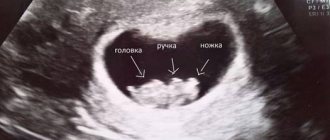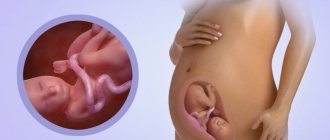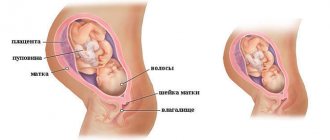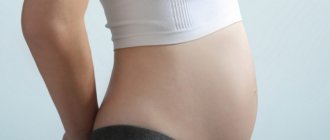Interesting Facts
| Options | Indications |
| Time from conception | 19 weeks |
| Period by month | 21 weeks |
| What month | 5 |
| Dimensions and weight of the fetus | 260-270 mm, 350 g |
| Uterus dimensions | 2 cm above the navel |
| Pregnant weight | From the beginning of pregnancy +3.5-6 kg, increase over the last week no more than 400-500 g |
Your baby is the size of
Large carrot
260-270mm Size
350 g Weight
The unpleasant symptoms of the first trimester of pregnancy are over, but the belly is not yet large enough to cause significant discomfort. Therefore, at 21 weeks the mother usually feels good and confident. And the unborn child continues to grow and develop, his motor activity increases.
Feelings of the expectant mother
Normally, a woman gains 6-6.5 kg, the weekly increase is 500-800 grams. Monitor your weight yourself: a sharp increase is an alarming symptom.
You may occasionally feel a tug in your lower abdomen. If the sensations are moderate, are not accompanied by bleeding and go away on their own, there is nothing to worry about. Pain may be associated with increasing stress on the ligamentous apparatus that holds the uterus, as well as with false Braxton-Hicks contractions. They are named after the doctor who first described them. The reasons for the phenomenon are not fully understood, but starting from 21-22 weeks of pregnancy, this is a completely normal condition.
Fetal movements bring great joy and new impressions to a woman during this period. Now this is no longer a barely perceptible fluttering or gurgling, but full-fledged tremors, which can be observed even visually.
The question “how often should a baby move” at 21 weeks is not yet so pressing. You can count at least 10-12 episodes of movement per day from 26-28 weeks. But if you suddenly stop feeling the movements of the fetus in the womb, this is a reason to consult a doctor: he will listen to the baby’s heartbeat and, if necessary, refer him for an ultrasound.
Fetus. Development at 21 weeks
Fetal development at 21 weeks
By the 21st week of pregnancy, the main systems and organs of the unborn child have already been formed, the period of establishing their work begins, the organs mastering all the necessary functions. The fetus begins to gain weight and grow faster. So far it is about 27 cm long and weighs about 360 g. Over the next 18-20 weeks, it needs to grow to 50 cm and increase its weight 10 times (up to 2.7-5 kg).
Accelerated weight and height gain from the 21st week is facilitated by changes in the hormonal background of the unborn child. At this stage of pregnancy, the endocrine system begins to work. Consisting of the pineal gland, pituitary gland, pancreas and thyroid glands, adrenal glands, thymus, it plays an important role in the life of every person, determining many features of the behavior of internal organs. Its main functions:
- coordination and regulation of the work of all body systems with the help of hormones;
- adaptation to changes in the external environment to maintain the constancy of the internal one.
The hormones produced allow you to speed up or slow down the functioning of organs, stimulate the processing or production of necessary substances. For example, in case of danger, a hormone is released - adrenaline, which increases blood flow to the heart.
Changes occur in the immune system. The fetus is already producing leukocytes, which this week are actively learning from the mother’s body. The so-called “passive immunity” is very important for the unborn child, because it is it that will provide the newborn baby with protection from most infections, the primary immune response. Leukocytes learn to resist the threat, recognize it and neutralize it. A weak defense is formed.
Important transformations occur in the nervous system. The brain, the basis of the central nervous system, is actively developing and improving. Signals sent to every muscle of the body become clearer and faster. Thanks to this, the movements performed by the fetus in the uterus become increasingly coordinated, subordinate to innate reflexes. At this time, the active generation of new brain cells continues, but their number will very soon be sufficient, the total weight of the brain will be 100 g.
This week the fetus learns to rest and stay awake at different times. Now, during sleep, the unborn baby practically does not move, but actively moves during the waking period. This change can be noted by women who have already heard the toddler’s movements. The baby's active movements are replaced by periods of calm with an interval of about 4 hours. Most often, the period of fetal wakefulness occurs during the woman's night sleep.
Interestingly, while the fetus is awake, its eyes open slightly, but it cannot see yet. Vision is still very imperfect; visual analyzers still have to develop and learn to perceive the world around them after birth.
Specialization of brain neurons occurs. The cerebellum begins to receive a copy of all the information coming to the brain and begins its functions: coordinates movements, regulates muscle tone and the location of the limbs in space. From this week, the vestibular apparatus begins to form and develop in the unborn child.
The senses continue to improve. Taste buds learn to recognize taste. Before this, the baby could only feel the sweet taste of amniotic fluid if the mother ate a chocolate bar or candy. At week 21, he can already feel and distinguish between salty, bitter, and sour. A little later, the woman will be able to notice how the fetus reacts to the food eaten. Often he begins to become active, reacting to something very “tasty” or unpleasant.
Interesting. Scientists suggest that it is from the 21st week of pregnancy that the unborn baby begins to develop taste preferences. A woman should eat right in order to accustom her child to healthy food in advance.
Changes occur in the appearance of the fetus. This week the most significant change in the skin. A thin layer of fat appears under the skin, giving it a pinkish color. By smoothing out the main folds, it makes the unborn baby plumper. The process of appearance of subcutaneous fat on the face has not yet begun, so it appears wrinkled.
Serious work is also going on in the digestive system. Debugging the process of digesting food takes a lot of time. At this stage, the toddler swallows amniotic fluid, which, entering the stomach, is processed by gastric juice (it already contains a small amount of hydrochloric acid). The released sugar and water pass further into the intestines, where they are absorbed into its walls. Unnecessary substances (epithelial cells, lanugo particles, etc.) remain in the colon in the form of meconium (original feces). In the first days after birth, the baby will poop dark green or almost black feces. There is no need to be scared - this is meconium.
The fetal reproductive system continues to develop at week 21. In girls, the process of formation of the vagina is underway, in boys - the penis and testicles. When examining the fetus on an ultrasound, it is almost impossible to make a mistake in determining the sex. Most often, mistakes occur due to the position occupied by the unborn child. For example, if a baby lies sideways to the device, with the handle between his legs, then it is not always easy to understand exactly who is on the screen: a boy or a girl.
Pregnancy 21 weeks: fetal development
In size it can be compared to a large carrot. His height is 26-27 cm from head to heels, average weight is 350 grams. The baby has room in his stomach, and he makes a variety of movements, turns and somersaults, pushes with his legs.
Sleep-wake cycles appear. And most often they do not coincide with my mother’s. When you are in motion, it rocks the baby, and he most often sleeps. And vice versa, when you lie down, he wakes up.
A baby at 21 weeks of pregnancy gradually swallows amniotic fluid, so he learns to swallow and digest food. The taste of the amniotic fluid depends on what the mother had for dinner. The taste buds of the fetus already distinguish between tastes, and it has been proven that in the future children prefer exactly the food that the woman ate during pregnancy.
How the baby grows at 21 weeks
At 21 weeks the baby is about the size of a carrot.
At week 21, the Baby has grown a little more - to 22-23 cm, his weight has increased to 270-310 g. At this time:
- the skin begins to thicken, becomes a little rougher, although it still remains very tender;
- glands located in the skin produce a special lubricant consisting of the secretion of the sebaceous glands and epidermal scales. The lubricant protects the baby’s delicate skin from mechanical damage, protects against harmful microorganisms, has bactericidal properties, and forms the immunity of the skin itself. Amniotic fluid can no longer penetrate the Baby's skin - lubricant prevents this. This lubricant is also called vernix, it helps to “glide” along the birth canal - you can see it on the Baby’s body when he is just born;
- small fatty deposits form under the skin, making it less transparent;
- You can determine your Baby's blood type and Rh factor.
Tests and ultrasound
By the 21st week of pregnancy, the results of a triple test will be known, identifying the risk of chromosomal abnormalities and hereditary diseases. If they turn out to be positive or doubtful, additional examination will be needed: a repeat blood test, invasive methods, for example, amniotic fluid sampling.
A woman should visit a gynecologist at least 1-2 times a month. Before this, you need to take a general urine test. The doctor monitors the development of the fetus and changes in the mother's condition by measuring indicators such as the baby's heartbeat, the mother's blood pressure and weight, the height of the uterine fundus and the volume of the abdomen.
What to discuss with your doctor
- It is not uncommon to experience leg cramps at night. The cause is increased load on the lower limbs during the day or a lack of magnesium. Be sure to consult a gynecologist if cramps occur frequently.
- Due to the pressure of the uterus, you may experience heartburn during the 21st week of pregnancy. Small meals and following a diet that excludes fatty and spicy foods will help you cope with it. Discuss with your GP what medications you can use to help relieve your condition as well.
Mother. Changes in the state of the body at 21 weeks
Mom's health at 21 weeks
The 21st obstetric week of pregnancy is a calm period during which most women feel satisfactory. The majority of expectant mothers already clearly feel the movements of the fetus in the uterus, but some, usually women carrying their first child, can expect this important event in the next 7 days. Normally, the baby's movements can be felt until the 22nd week of pregnancy.
The overall satisfactory condition may be overshadowed by unpleasant sensations and signs of deadline. Most often this week pregnant women complain about:
- heartburn, constipation, severe flatulence, heaviness in the stomach - dyspepsia . Unpleasant, often painful sensations in the gastrointestinal tract are in most cases caused by an increase in the size of the uterus. It puts pressure on the stomach, as a result of which gastric juice enters the esophagus through a weakened sphincter, causing heartburn.
Throughout pregnancy, the process of digesting food is slower than usual so that the body can take the maximum amount of useful substances; pressure from the uterus and this factor cause heaviness and discomfort in the stomach after a heavy meal.
Constipation and flatulence appear due to pressure from the uterus on the intestines. It is recommended to monitor daily bowel movements and take measures to soften the stool (eating dried apricots, prunes). If stool is delayed for more than 3 days, you should consult a gynecologist. You may need to take additional medications.
- shortness of breath . The growing uterus also puts pressure on the lungs. Very often during this period, women complain of the inability to take a deep breath. A pregnant woman's breathing becomes shallow and frequent. It is advisable to continue to exercise, thoroughly ventilate the room in which the pregnant woman is located, and walk outside more often.
- frequent urination. The uterus puts pressure on all nearby organs. By the 21st week, frequent urination returns. As the weight of the fetus increases, the pressure will increase and will become weaker only closer to birth, when the fetus is preparing to leave the mother’s body.
Help to reduce the frequency of visiting the toilet:
- training the vaginal muscles using Kegel exercises;
- bending forward before urinating. This puts extra pressure on the bladder and more fluid comes out.
- swelling . The pathological process of fluid retention in the body occurs in many women. Typically, swelling begins to appear on the face, then on the legs and arms. If a woman notices this symptom, she needs to tell her gynecologist about it.
During pregnancy, the amount of blood in the female body increases by approximately ⅓. The kidneys are forced to work at their limit, filtering the blood of the woman and the fetus. Quite often it is difficult for them to remove excess fluid in a timely manner. To alleviate the situation, you need to make changes to your diet (reduce the amount of salt, eliminate harmful foods) and carefully monitor the condition of your kidneys, and if necessary, take medications prescribed by your gynecologist. In the absence of competent control over the work of this paired organ, edema can become a harbinger of gestosis (late toxicosis).
- sudden weight gain. The reason for sudden weight gain in the 21st week of pregnancy may be swelling or excessive appetite. Both of them can lead to unpleasant consequences. Extra pounds gained during pregnancy can worsen a woman's health and cause problems during childbirth. It should be remembered that the weight gained is not always easy to remove after childbirth, and in some cases it is impossible.
- increased sweating. Some women begin to experience sweating at 21 weeks. Most often, sweat appears in large quantities under the chest and abdomen. This is normal and requires additional attention to hygiene. It is advisable to take a warm shower 2 times a day and wash off the sweat with clean warm water as needed. The use of deodorants during pregnancy is not recommended.
- increase in leg size . Quite often, by the 21st week, a woman may find that previously suitable shoes have become small and tight. There may be several reasons for this phenomenon: edema, weight gain, swelling of overworked legs. In any case, you should not wear tight shoes; it is better to replace them with a comfortable option that fits in size.
- stretch marks. This week, the active growth of the abdomen and chest continues. As a result, stretch marks (stretch marks) may appear. Unsightly red stripes on the sides of the abdomen and chest are the result of low skin elasticity. It is advisable to prevent the appearance of stretch marks using specialized creams or olive oil. Before use, consult a gynecologist;
- sleep disturbance . The larger your belly becomes, the more difficult it is to find a comfortable sleeping position. Pregnant women in the 21st week of pregnancy often complain that it is difficult for them to fall asleep, they often want to go to the toilet at night, the grown fetus is active, tumbling in the stomach, heartburn, cramps and other sensations interfere. A thorough analysis of your well-being will help you cope with the situation. To lie down comfortably, you can use a special pillow for pregnant women or place small “dummies” under your legs and lower back. To reduce the number of trips to the toilet, you should try to drink less before bed. A light, small dinner will help avoid heartburn. If seizures occur, consult a gynecologist.
Most of the discomfort that appears at 21 weeks of pregnancy can be avoided or reduced in intensity. It is advisable to report any changes in your health to your gynecologist so that individual ways to combat the signs of your period can be selected.
Possible complications
The twenty-first week of pregnancy is a relatively calm period. The risks of spontaneous abortion are minimal compared to the first trimester. However, you need to know those alarming symptoms that indicate complications of pregnancy and require immediate medical attention. Timely treatment in most cases allows you to save the fetus and minimize risks for the woman.
Placental abruption
This diagnosis is made if the placenta separates from the physiological attachment site in the uterine cavity. Manifests itself in the form of heavy bleeding, dizziness, hypotension and severe pain in the lower abdomen. The condition requires immediate treatment in a hospital setting.
Low placentation
If ideally the placenta is attached to the highest point of the uterus, but with low placentation it is located closer to the exit of the uterus. This is dangerous because as the fetus grows, the placenta may begin to separate. There is no specific treatment. Physical activity and sex are prohibited for a pregnant woman; regular frequent monitoring by a specialist is indicated.
Lifestyle recommendations
- Do not lift heavy objects and avoid stressful situations, as these are additional risk factors that affect the tone of the uterus.
- Do not use aggressive household chemicals: harmful volatile substances entering the body through the respiratory tract can lead to poisoning.
- Do not visit a bathhouse or sauna, do not take a bath or shower with a water temperature above 37-38°C, since steam and hot water raise a woman’s body temperature, which provokes developmental defects in the child, and in some cases leads to the threat of miscarriage.
- Wear shoes that are spacious, do not constrict your feet, and do not have high heels.
- Sleep on your left side with pillows under your back and between your knees. Take rest during the day.
It is possible and it is not possible
In order to provide the fetus with everything necessary for development, while maintaining her own health, a pregnant woman should not only eat well, but also try to follow some rules:
- Avoid harmful substances: alcohol, nicotine, narcotic and toxic substances;
- Ensure a minimum of contact with heavy chemical compounds: detergents and cleaners, building materials and paints (for walls, floors, hair, etc.);
- Walk outside every day, move more. It is advisable to spend at least 40 minutes a day outdoors, engage in permitted sports (swimming, walking, Pilates, water aerobics);
- Follow the gynecologist’s instructions, take tests in a timely manner, undergo examinations;
- Avoid self-medication and the use of traditional recipes without consulting a doctor;
- Maintain a good mood, monitor stress levels;
- Wear comfortable clothes and shoes;
- Carefully monitor hygiene;
- Do not lift heavy objects, avoid physical fatigue;
- Without the permission of the gynecologist, do not visit baths, saunas, or take hot baths;
- Avoid crowded places and try not to come into contact with sick people.
Sex
In the absence of complications, discomfort, pain and direct instructions from the gynecologist, intimate life in the 21st week is not prohibited. Positive emotions from contact between future parents will help a woman maintain a good mood. It is advisable to choose poses in which there is no direct pressure on the abdomen, and the pregnant woman feels comfortable.
Checklist for 21 weeks of pregnancy
The tendency to stretch marks is genetically determined, so if you are predisposed, you cannot completely avoid them. However, there are effective ways to reduce their consequences:
Entrust your pregnancy management to the specialists of the Medical Women's Center. We offer an individual approach, convenient appointment times without queues, constant communication with your doctor, all tests and studies in one place.










